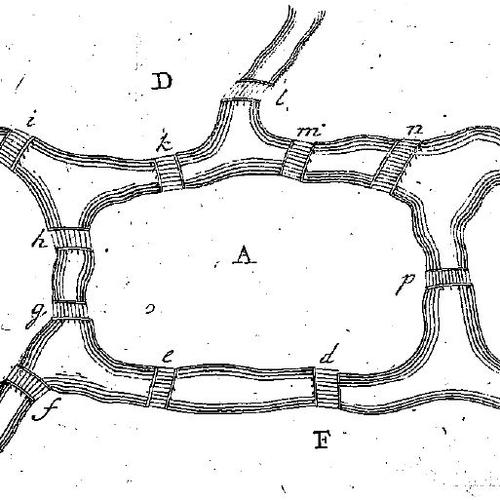Research Agenda
Solutio problematis ad geometriam situs pertinentis, Fig. 3.
Image Credit: Leonhard Euler (Public Domain)
Research Area 5, "Building Digital Communities", contributes the concept of data-rich literary history to the Cluster's relational, de-centred and multiply entangled approach to writing literary history in a global perspective. In so doing, Research Area 5 concentrates on three levels of work: data sets, data models and visual formats.
Data sets
Acts of collecting and annotating literary data are just as critical and interpretive as literary analysis. Our aim is to increase the transnational consciousness of data-rich literary history and thereby counter the widespread tendencies by which the large corpora of American and British literature are treated as if they constituted a universal literary record. It is necessary to disrupt the implicit national biases and totalising impulses present in our digital collections if we want to prevent our scholarship from merely reproducing literary, historical, and cultural canons that efface so many 'communities' and suppress their transnational and transtemporal entanglements as well as their stories as of yet untold.
Data models
The call for a critical interrogation of perceived literary globality also applies to the data models we will design to represent the entangled relationships of literary production, transmission and reception. As we try to get a 'digital grip' on the multiple shifts in meaning and framing these operations signify, we will critically reflect on how to (re-)construct 'temporal communities', both hermeneutically and digitally. Thus, we will test the Cluster's core concept against the constraints and implicit biases of the digital even as we simultaneously endeavour to explore the potential of computational approaches within the critical discourse of the humanities.
Visual formats
By experimenting with visualisation techniques, Research Area 5 will explore whether – and if so, how – the Cluster's approach to literary history in a global perspective translates into digital-visual formats, using visualisation as an opportunity to reflect on research processes in an explorative way. In our approach, visualisation acts as a means by which we confront the epistemic implications and the methodological issues of interpreting with visual representations.
In each of these three focus areas, Research Area 5 sees data-rich literary history not as a means of completion or closure of research, but as a means to support diverse forms of literary investigation, whether enacted through traditional or computational means. Working with mass-digitised collections, modelling complex global entanglements through space and time and engaging with visual renderings of curated data in no way exhausts – or even comes close to exhausting – the potential questions and arguments that expanded bibliographical and biographical records (and their multiple connections and relations) might support.
